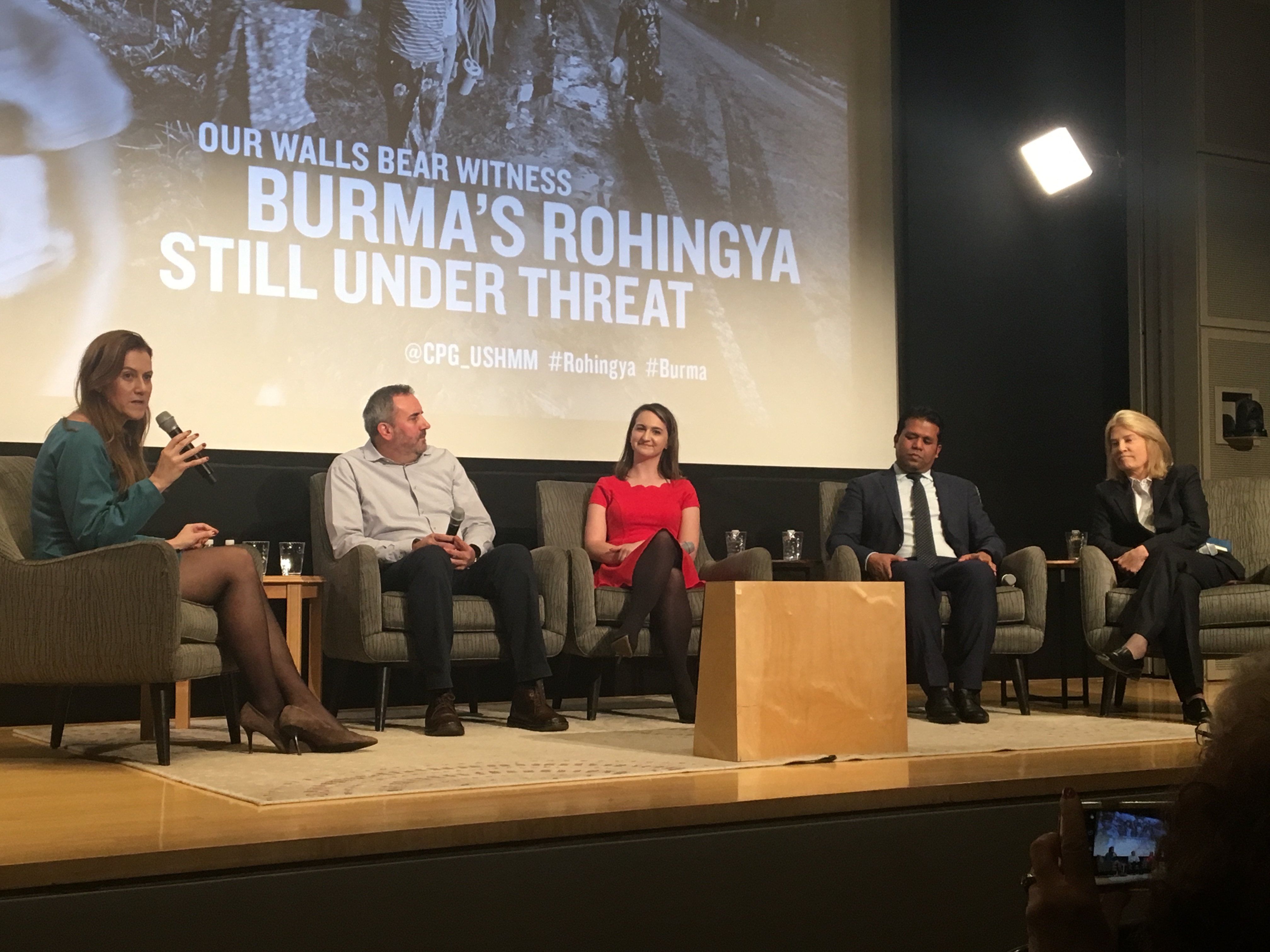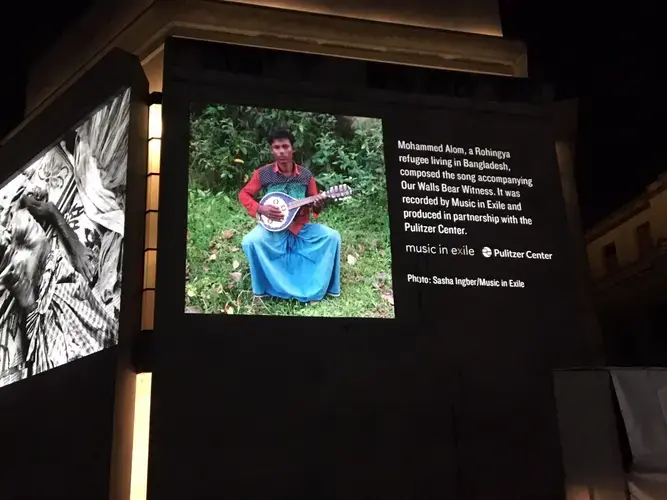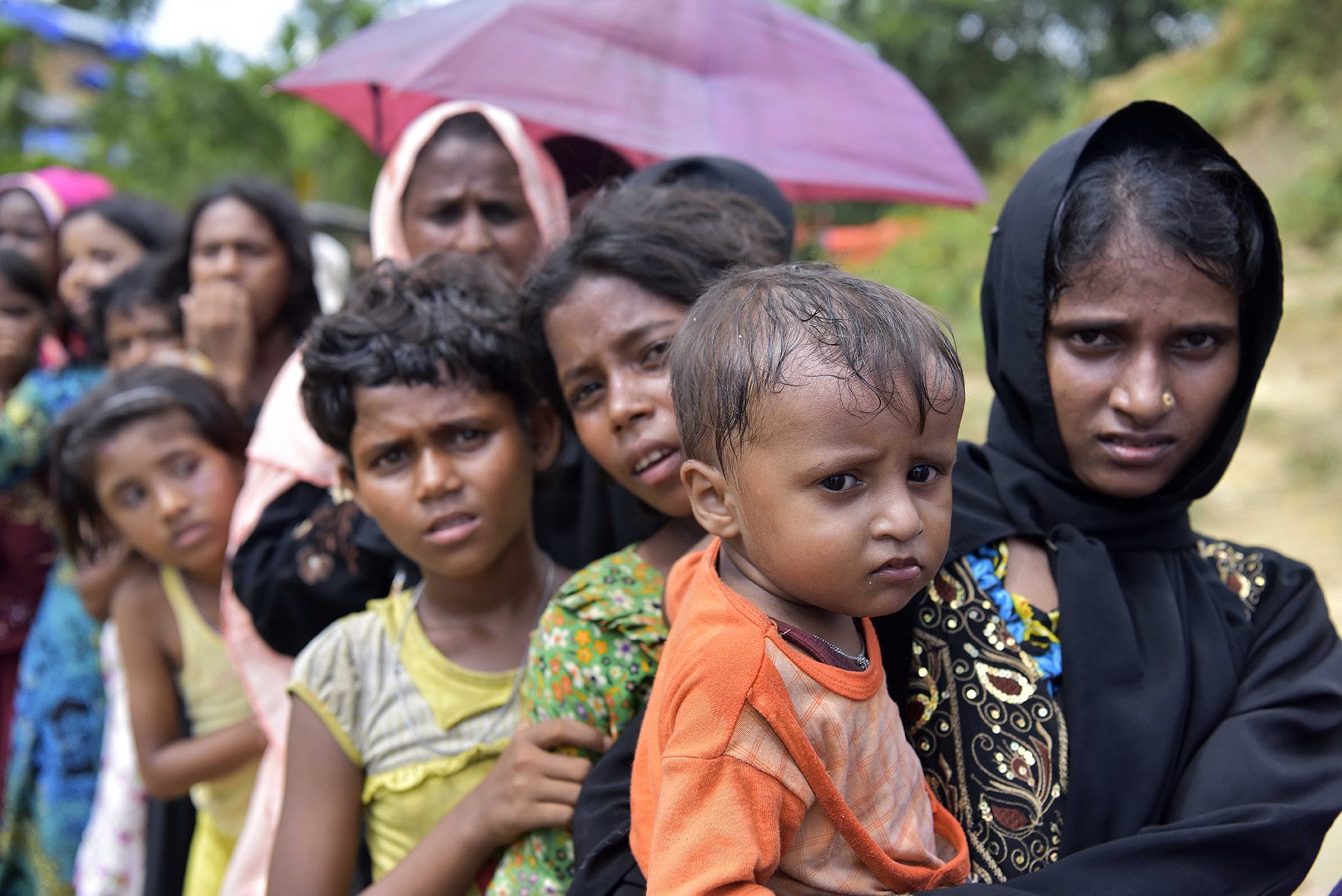
70 years ago, after witnessing the atrocities of the Holocaust during World War II, the United Nations adopted the Convention on the Prevention and Punishment of the Crime of Genocide. But in the decades since, Burma’s Muslim Rohingya minority have suffered severe discrimination and persecution, escalating in recent years to mass killings, sexual violence, torture, and forced displacement at the hands of the government. Thousands of Rohingya have fled to refugee camps in Bangladesh, where rainy seasons and overcrowding only exacerbate mental and physical trauma.
The United States Holocaust Memorial Museum’s Simon-Skjodt Center for the Prevention of Genocide held a panel discussion on Wednesday, December 5, 2018, featuring journalists who have witnessed the conflict firsthand. The panel launched the "Our Walls Bear Witness" exhibition featuring the work of photojournalist Greg Constantine, a former Pulitzer Center grantee whose photographs were projected on the exterior wall of the Holocaust Memorial Museum. Music by Rohingya refugees, recorded by Pulitzer Center journalist grantee Sasha Ingber with the nonprofit Music in Exile, accompanied the photographs.
Naomi Kikoler, deputy director of the Simon-Skjodt Center for the Prevention of Genocide, moderated the discussion, which began with a keynote address from Irene Fogel Weiss, who was one of the only members of her family to have survived Auschwitz-Birkenau.
“Our pain and suffering was sharpened by the hopeless feeling that we had been abandoned, first by our government and our neighbors, and then by the rest of the world,” Weiss said. “Of course, it’s now clear that much of the world did know about the persecution of the Jews...It is tragic that over 70 years later, the world again looks on as the regime in Burma commits hideous atrocities against its own citizens.”
“What is being shown on the walls of the museum for tonight and the next few nights is work that was produced from September of 2017 to two trips to Bangladesh this year,” said Constantine.
He spoke of a gravesite, one of more than 50 in the refugee camp at Cox’s Bazar in southeastern Bangladesh that he passed and photographed every day as more graves were added over the course of a month. “The deaths of people from the Rohingya community in Bangladesh, as stateless refugees, should be linked directly to the actions of the Burmese government from last year.”
Greta Van Susteren, host of Voice of America’s Plugged In with Greta Van Susteren, repeatedly faulted the U.S. media for failing to give adequate coverage to the crisis. “The crude answer is that it’s expensive,” she said. “It’s cheap to put people in a studio and complain about tweets. It’s very expensive to send reporters out…people care, but these news organizations are not sending people to go look at it.”
“Journalists all over the world are lacking the resources to do meaningful work,” responded Constantine. “They have only short periods of time to be able to do it… but this is a story that demands more than just breaking news...[My role as a photographer] has been to try to create sustained, long-term documentation of what’s happened to this community over more than a decade. And it’s been to use that work to then spark people to have a deeper sense of understanding and meaning as to all the different facets of this story.”
“I think it’s in the U.S. government’s best interest to issue a determination of genocide,” said Olivia Enos, a policy analyst in the Asian Studies Center at the Heritage Foundation. “The administration has a policy of free and open Indo-Pacific strategy in Asia, and that ‘free and open’ bit should mean we’re promoting human rights for all people in Asia, and all people in the world, frankly.”
Enos noted that an official recognition of genocide opens policy doors to greater humanitarian assistance across countries, a crucial step forward as the refugee crisis continues in its second year.
“Recognizing genocide is very important, because the Burmese government says [Rohingya Muslims] do not exist,” said Tun Khin, founder and president of Burmese Rohingya Organization UK, an advocacy group for the ethnic Rohingya not recognized as citizens of Burma. The first thing refugees in the camps said they wanted, Khin said, was justice: for the people who killed their siblings, parents and friends to be held accountable for their actions. And the Rohingya want a seat at the table as the international community decides how to move forward. Because, as Khin said, “we’ve been sidelined, in Burma and outside.”

After some questions from audience members, the panelists and attendees donned their coats to view Constantine’s photographs on the walls of the Holocaust Memorial Museum and listen to traditional Rohingya music. Over sirens and other sounds of downtown D.C. life, a driving melody from an eight-string mandolin accompanied the voice of singer Mohammed Alom, wistful sounds of another place and time. The images on the walls depicted a stateless people, victims of hatred and violence. But the swelling music served as a reminder that these are a people with agency and identity, people who refuse to be extinguished. For in the dark times, as Bertolt Brecht said, there will also be singing.









